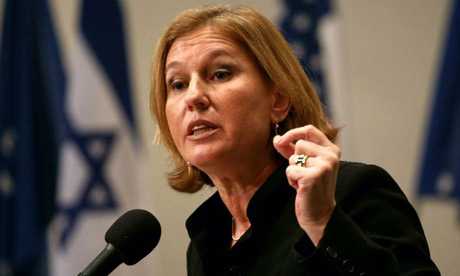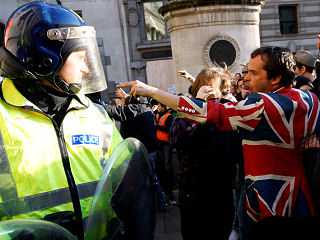Warrant issued over war crimes accusations was withdrawn when it emerged former minister had cancelled plan to visit
- Ian Black and Ian Cobain
- Monday 14 December 2009

A British court issued an arrest warrant for Israel‘s former foreign minister over war crimes allegedly committed in Gaza this year – only to withdraw it when it was discovered that she was not in the UK, it emerged today.
Tzipi Livni, a member of the war cabinet during Operation Cast Lead, had been due to address a meeting in London on Sunday but cancelled her attendance in advance. The Guardian has established that Westminster magistrates’ court issued the warrant at the request of lawyers acting for some of the Palestinian victims of the fighting but it was later dropped.
The warrant marks the first time an Israeli minister or former minister has faced arrest in the UK and is evidence of a growing effort to pursue war crimes allegations under “universal jurisidiction”. Israel rejects these efforts as politically motivated, saying it acted in self-defence against Hamas rocket attacks from Gaza.
Livni, head of the opposition Kadima party, played a key role in decisions made before and during the three-week offensive. Palestinians claim 1,400 were killed, mostly civilians; Israel counted 1,166 dead, the majority of them combatants.
No one involved in the Westminster episode was prepared to confirm, on the record, what had transpired in a chaotic series of highly sensitive legal moves. But a pro-Palestinian group welcomed news of the abortive move as “long overdue”.
The Foreign Office, clearly deeply embarrassed by the episode, said in a statement: “The UK is determined to do all it can to promote peace in theMiddle East and to be a strategic partner of Israel. To do this, Israel’s leaders need to be able to come to the UK for talks with the British government. We are looking urgently at the implications of this case.”
Livni’s office said she had decided in advance not to come to the UK but lawyers seemed unaware of that when they approached the court last week. The judge refused to issue the warrant until it was clear Livni was in fact in the country, as he was erroneously informed on Sunday.
The former minister had been scheduled to speak at a Jewish National Fund conference. “Scheduled meetings with government figures in London could not take place close to the conference and would have necessitated a longer-than-planned absence from Israel,” her office told the Ynet website.
It is the second time in less than three months that lawyers have gone to Westminster magistrates court asking for a warrant for the arrest of an Israeli politician. In September the court was asked to issue one for the arrest of Ehud Barak, Israel’s defence minister, under the 1988 Criminal Justice Act, which gives courts in England and Wales universal jurisdiction in war crimes cases.
Barak, who was attending a meeting at the Labour party conference in Brighton, escaped arrest after the Foreign Office told the court that he was a serving minister who would be meeting his British counterparts. The court ruled he enjoyed immunity under the State Immunity Act 1978.
According to Israeli sources, ministers who wish to visit the UK in a personal capacity have begun asking the Israeli embassy in London to arrange meetings with British officials. These offer legal protection against arrest.
Livni, crucially, cannot enjoy any such immunity as she is an ex-minister. Ehud Olmert, the former prime minister, is in the same position.
Because of the potential damage to UK-Israeli relations – and because of legal pitfalls facing those who disclosed information about the application – few people with any detailed knowledge of it were prepared to comment today.
The Ministry of Justice, Scotland Yard and clerks at the magistrates court refused to discuss the matter. A statement issued by HM Court Service implied that there had been no application for an arrest warrant, stating “there is no record of any such hearing”. A spokeswoman maintained that this was not a misleading statement.
Samuel Hayek, chairman of the Jewish National Fund UK, the charity whose conference Livni had been due to attend, said: “I am not at liberty to confirm her precise reasons for not attending.” He added: “In any event, it is regrettable that the British government is unable to conduct free dialogue with Israel’s most senior statesmen and politicians.”
Tayab Ali, the solicitor who tried to obtain a warrant for the arrest of Barak on behalf of 16 Palestinians, said his firm was “ready, willing and able to act for clients to seek the arrest of anyone suspected of war crimes” who travelled to the UK.
Livni’s office described her as “proud of all her decisions regarding Operation Cast Lead”. It added: “The operation achieved its objectives to protect the citizens of Israel and restore Israel’s deterrence capability.”
The Guardian





